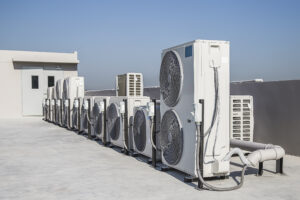Business owners and property managers must consider the return on investment (ROI) of every upgrade when considering commercial real estate investments. Whether you plan to sell your property or have long-term goals for its use, an efficient, well-maintained HVAC system plays a crucial role in overall property value. Beyond keeping spaces comfortable, HVAC systems influence energy costs, tenant satisfaction, regulatory compliance, and modernization efforts.
In this blog post, the commercial comfort specialists at MHC Air Services discuss the key factors to consider when assessing the impact of heating and air conditioning systems on commercial property values.
Energy Efficiency & Cost Savings
HVAC systems are one of the largest energy consumers in commercial properties. According to the U.S. Department of Energy, heating and air conditioning accounts for an estimated 30% of a commercial building’s total energy consumption.
Investing in energy-efficient upgrades can result in 10% to 20% savings on utility bills — a major incentive for property owners looking to strengthen their bottom line. By choosing a high-efficiency system, you can reduce operational costs, making your property more attractive to potential buyers and tenants who prioritize sustainability and lower overhead expenses.
Occupant Comfort & Productivity
A building’s HVAC system directly impacts the comfort of its occupants, including employees, customers, and tenants. A well-functioning system offers consistent temperature control, proper humidity regulation, and improved air quality — all of which contribute to better health and productivity. Benefits include:
- Fewer allergy and respiratory issues due to proper air filtration.
- Reduced spread of airborne illnesses like colds and flu, thanks to better ventilation.
- Increased employee efficiency and tenant retention as comfortable environments promote well-being and satisfaction.
A property with a reliable, high-performing HVAC system is more likely to attract and retain quality tenants, leading to stable long-term revenue.
Regulatory Compliance & Green Building Standards
Commercial properties must adhere to various energy efficiency and carbon emissions standards. Many cities and states have enacted regulations requiring buildings to meet green building certifications, such as LEED (Leadership in Energy and Environmental Design) or ENERGY STAR®.
Non-compliant HVAC systems may need to be upgraded before a property can be sold, making proactive improvements a strategic investment. Compliance not only prevents costly fines and legal issues but also enhances property appeal by demonstrating sustainability and environmental responsibility.
Modernization & Smart HVAC Systems
Upgrading to modern smart HVAC systems provides greater control, efficiency, and automation. These advanced systems offer:
- Smart thermostats that optimize temperature settings based on occupancy.
- Remote monitoring and diagnostics for real-time performance tracking.
- Automated maintenance alerts to prevent unexpected system breakdowns.
- Zone control capabilities to adjust airflow and temperature in different building areas.
By integrating smart technology, commercial property owners can reduce energy waste, extend equipment lifespan, and lower maintenance costs, making their properties more valuable and competitive in the market.
Depend on MHC Air Services for Commercial HVAC Upgrades
If you’re considering an HVAC upgrade to enhance your commercial property’s value, trust MHC Air Services to deliver the expert solutions you seek. Our team specializes in high-efficiency system, smart HVAC integrations, and compliance-driven upgrades that improve comfort and energy performance.
Contact us today to schedule a commercial HVAC upgrade to optimize your building’s system for long-term success and efficiency.

